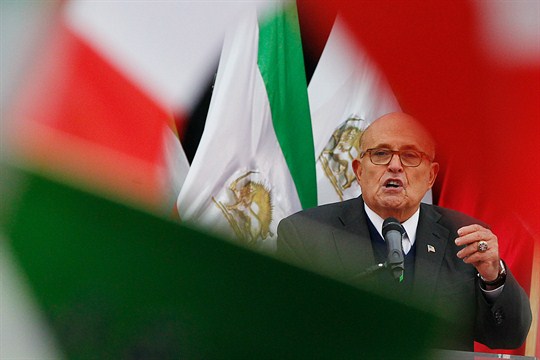Calls for democracy in Iran continue to grow louder
https://arab.news/pyqpw

The coronavirus disease pandemic would appear to require that this summer’s flagship annual Free Iran rally and summit be called off or scaled down. But the Iranians who desire nothing less than democracy for their nation have instead decided to effectively scale up the event by switching to an online venue via the use of modern technology. So, on Friday, tens of thousands of Iranians from five continents will join together for a virtual Free Iran global summit.
The organizers are using state-of-the-art communications tools to connect the attendees, which will include hundreds of distinguished lawmakers and personalities, as they strive to tell the world that Iran is ready for an end to clerical rule. Among the speakers are high-profile figures such as former New York Mayor Rudy Giuliani, one-time US vice presidential candidate Joseph Lieberman, ex-French Defense Minister Michele Alliot-Marie, former Italian Foreign Minister Giulio Terzi, ex-Canadian Foreign Minister John Baird, and Tom Ridge, the first US secretary of homeland security.
Last year’s Free Iran rally was held in New York, where Giuliani, who is now US President Donald Trump’s attorney, spoke at the event and said: “I accuse the ayatollah and (Iranian President Hassan) Rouhani and all of their sycophants and followers of mass murder, crimes against humanity. We should be embarrassed for our countries if they haven’t stood up against this. There’s no middle ground here. These people have killed at least 120,000 members and associates of this great organization.”
The Iranian regime has always been concerned about rallies that call for the establishment of democracy in Iran. For example, European officials foiled a terrorist attack that targeted the 2018 Free Iran convention in Paris, which I and many high-level speakers — including former US House of Representatives Speaker Newt Gingrich — attended. An Iranian diplomat and several other individuals of Iranian origin were subsequently arrested in France, Belgium and Germany. French officials came to the conclusion that the Iranian regime was behind the bomb plot. Paris then froze the assets of Iran’s intelligence agency and two of its agents.
The Iranian opposition and dissidents want to bring more attention to the unprecedented levels of social, economic and political unrest that the regime has faced for more than two years. During the widespread protests of 2017 and 2019, slogans that became popular and entered the mainstream included “Death to the dictator,” “Hard-liners, reformists, the game is over,” and “Death to Khamenei” — a crime that carries the death penalty in Iran. People were also chanting, “Death to Rouhani,” “Shame on you Khamenei, step down from power,” and “Death to the Islamic Republic.”
Supreme Leader Ali Khamenei was blunt in his acknowledgement of the role of the opposition in the protests. “The incidents were organized” and carried out by the National Council of Resistance of Iran (NCRI), he said, adding that the group “had prepared for this months ago” and their “media outlets had called for it.” In the run-up to the uprisings, activists associated with the NCRI had put up numerous anti-regime posters in Iran, which were generally accompanied by images of Maryam Rajavi, the NCRI’s president-elect.
During the November 2019 uprising, more than 1,000 protesters were shot dead by the regime’s forces, according to Reuters. Last December, Rajavi insisted that “the international community must take urgent action to stop the killings and ensure the release of those arrested… Only the end of this regime will bring peace and security to the Middle East and peaceful coexistence among all nations.”
When it comes to confronting the regime, the views of Khamenei and the senior cadres of the Islamic Revolutionary Guard Corps are anchored in the belief that the soft power of Iran’s ordinary people and opposition is much more potent than the military capacities of foreign powers.
During the November 2019 uprising, more than 1,000 protesters were shot dead by the regime’s forces.
Dr. Majid Rafizadeh
The Iranian opposition calls for a democratic system of governance in Iran, freedom of religion, social justice, the rule of law and respect for human rights. However, the international community has failed to exhibit the kind of support that would make the Iranian regime think twice before instituting another crackdown. Fortunately, domestic opposition to the theocratic establishment has remained strong and shows no sign of abating.
History has shown us that any attempt to promote moderation within the Iranian regime has failed. The US and the international community must continue to reach out to the Iranian people and the resistance, who reject the regime and call for a representative government.
The Iranian regime is facing an unprecedented level of domestic and foreign pressure. And, more than ever before, the Iranian people have shown their readiness for democratic change. The time has come for the governments that are pursuing appeasement policies with Tehran to take a new approach.
- Dr. Majid Rafizadeh is a Harvard-educated Iranian-American political scientist. Twitter: @Dr_Rafizadeh









































